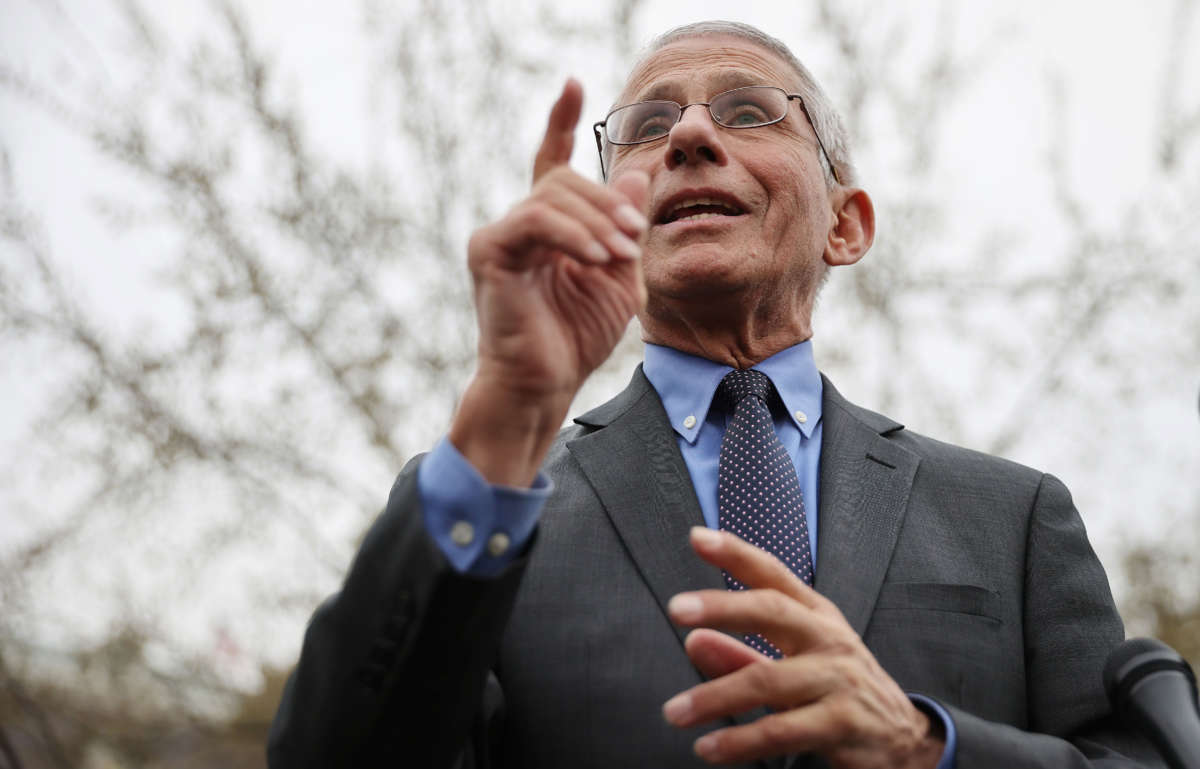On Tuesday morning, Anthony Fauci, a member of President Donald Trump’s coronavirus task force and the head of the National Institute of Allergy and Infectious Diseases, responded to criticisms made against him on social media that were shared by the commander-in-chief.
Trump retweeted a post on Twitter that suggested Fauci wasn’t being truthful on several topics, including a controversial drug called hydroxychloroquine that the president had peddled, without scientific backing, as a means to treat COVID-19.
“Dr. Fauci has misled the American public on many issues, but in particular, on dismissing #hydroxychloroquine and calling Remdesivir the new gold standard,” the social media post that Trump had shared said.
While initial study of Remdesivir has shown some limited promise for treatment of COVID-19, a number of studies for hydroxychloroquine have actually shown it may be more dangerous for use against the disease than conventional treatment.
Fauci addressed the indirect critique from Trump head-on in an interview with George Stephanopoulos on “Good Morning America” Tuesday, first pointing out that he personally tries to avoid social media sites like Twitter.
“I don’t tweet, I don’t even read them,” Fauci said of Trump’s critical tweets and others like them. “So I don’t really want to go there. I just will continue to do my job no matter what comes out, because I think it’s very important.”
On whether people should trust him or not, Fauci assured the host he wasn’t being dishonest when speaking about the coronavirus pandemic.
“I have not been misleading the American public under any circumstances,” he said.
The Food and Drug Administration ended emergency use authorization for hydroxychloroquine last month, after determining that the drug “showed no benefit for decreasing the likelihood of death or speeding recovery.”
Trump had pushed the drug, without citing any medical evidence for its benefits, during a number of coronavirus press briefings earlier this year, as well as on social media. He tamped down his promotion of the drug somewhat after studies showed that it was not helpful, but latched onto it once again in July following the release of a highly suspect Henry Ford Health System study that some say was flawed, particularly because it did not use a randomized sample.
“The highly respected Henry Ford Health System just reported, based on a large sampling, that HYDROXYCHLOROQUINE cut the death rate in certain sick patients very significantly,” Trump tweeted out immediately after.
At the time, Trump also accused those who had been skeptical of the drug of being so in order to make him look bad. “The Dems disparaged it for political reasons (me!). Disgraceful,” he said, adding that the FDA should “act now on it” to restore its emergency use authorization.
While Trump has stated publicly that he and Fauci have a good relationship with one another, the president’s actions say otherwise, with the White House going so far as to launch a smear campaign against the doctor earlier this month. Those efforts backfired, however, and the president finally had a phone conversation with Fauci, the first time Trump had talked to the nation’s top infectious diseases expert in months.
So deep-seated is Trump’s apparent resentment toward Fauci that the president apparently lied about having been invited to, but being unable to throw out, a first pitch at a New York Yankees game later this year, after Fauci had thrown the first pitch for a Washington Nationals game this week.
Trump had claimed he could not attend the game in New York, set to happen in August, because he was too focused on the pandemic and the economy, but in fact he was never formally invited by the organization for that specific time. An open-ended invitation by the Yankees organization had been extended to the president, but even they were caught off-guard by his saying he was scheduled to attend a game.
More Americans view Fauci as a trustworthy figure on COVID-19 than do Trump, according to a recent Economist/YouGov poll.
Just 32 percent of the country says they trust the president “a lot” or “somewhat” to give out medical advice, while 54 percent say the same for Fauci. A majority of Americans, 52 percent, say they “somewhat” distrust or distrust Trump “a lot” when he gives out said advice.
Join us in defending the truth before it’s too late
The future of independent journalism is uncertain, and the consequences of losing it are too grave to ignore. To ensure Truthout remains safe, strong, and free, we need to raise $46,000 in the next 7 days. Every dollar raised goes directly toward the costs of producing news you can trust.
Please give what you can — because by supporting us with a tax-deductible donation, you’re not just preserving a source of news, you’re helping to safeguard what’s left of our democracy.
